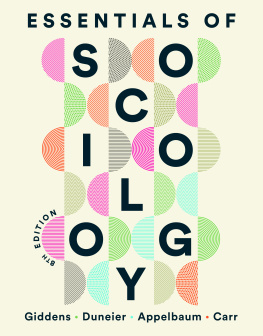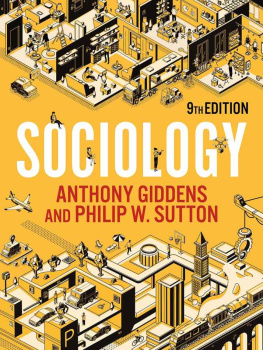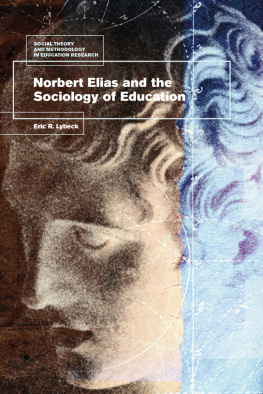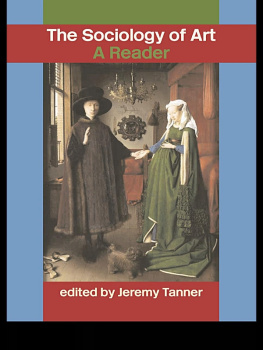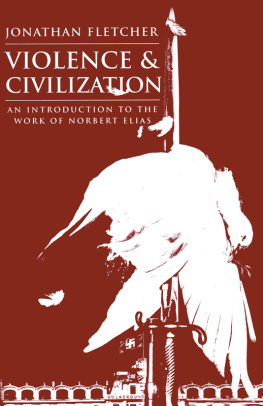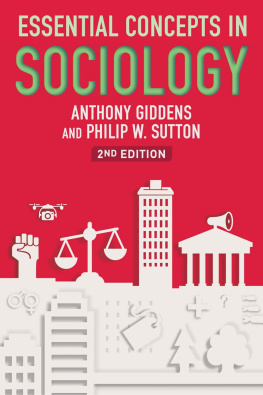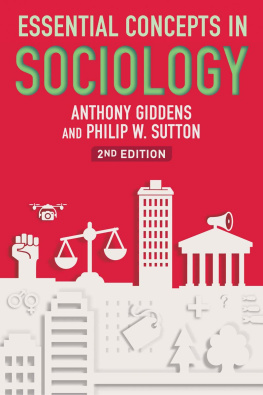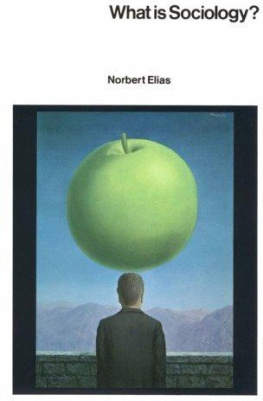Advance Praise for Norbert Elias and Modern Sociology: Knowledge, Interdependence, Power, Process
This is an engagingly written book by two of the worlds leading experts on the work of Norbert Elias. Focusing on Eliass sociology of knowledge they show how this might bring sociologists nearer to a cumulative theoretical and empirical science of human social relations. Indispensable.
Ian Burkitt, Reader in Social Science, University of Bradford, UK
A state-of-the-art assessment of the significance of Norbert Eliass contribution to sociological knowledge and thought.
Professor Johan Goudsblom, University of Amsterdam, The Netherlands
Given the recent importance afforded to Norbert Eliass work in sociology there has been surprisingly little written on him. This book certainly fills that void. Dunning and Hughes provide a powerful and original overview of Eliass work that is written in a jargon-free, fluent, and clear style.
Steven Loyal, University College Dublin, Ireland
In an era when sociology has lost its way, Dunning and Hughes have produced an accessible and stimulating analysis of contemporary disciplinary and societal crises that provides an invaluable explication and development of the writings of the last great classical sociologist of our time, Norbert Elias.
Professor Chris Shilling, Director of Graduate Studies (Research), University of Kent, UK
Eric Dunning and Jason Hughes manage admirably to demonstrate the key ideas and their origins of this great sociologist, and to locate them in the context of contemporary discourse. Written in a clear, but never oversimplified language, the book helps us to better understand how Eliass theories enable us to overcome the paradigmatic fragmentation of todays many sociologies.
Helmut Kuzmics, Professor of Sociology, University of Graz, Austria
By using Eliass sociology of knowledge to contextualize the current crisis in sociology, Dunning and Hughes bring a freshness and contemporary relevance to a familiar but often misunderstood theoretical perspective. Their ultimate goal is even more ambitious: to reinvigorate sociology to meet the challenges of the twenty-first century. Consequently, Norbert Elias and Modern Sociology is a must read for Eliass devotees and detractors alike.
Dominic Malcolm, Senior Lecturer, Loughborough University, UK
Norbert Elias and Modern Sociology
Knowledge, Interdependence, Power, Process
Eric Dunning
Jason Hughes
BLOOMSBURY ACADEMIC
Bloomsbury Academic
An imprint of Bloomsbury Publishing Plc
50 Bedford Square 175 Fifth Avenue
London New York
WC1B 3DP NY 10010
UK USA
www.bloomsbury.com
First published 2013
Eric Dunning and Jason Hughes, 2013
This work is published subject to a Creative Commons Attribution Non-Commercial Licence. You may share this work for non-commercial purposes only, provided you give attribution to the copyright holder and the publisher. For permission to publish commercial versions please contact Bloomsbury Academic.
CIP records for this book are available from the British Library and the Library of Congress
ISBN: HB: 978-1-78093-225-5
ISBN: PB: 978-1-78093-226-2
ISBN: ePub: 978-1-78093-339-9
Visit www.bloomsburyacademic.com to find out more about our authors and their books. You will find extracts, authors interviews, author events and you can sign up for newsletters to be the first to hear about our latest releases and special offers.
Cover image Horst Tappe/Lebrecht Music & Arts
For Florence, James and Sophia
while the unknown world or, expressed differently, the ocean
of peoples ignorance like the universe itself may not be finite,
the island of reliable knowledge of the universe built into the
limitless ocean of our ignorance can be made to grow.
Norbert Elias (2009c: 179),
The Creed of a Nominalist: Observations on Poppers
The Logic of Scientific Discovery,
University College Dublin Press.
Contents
Acknowledgements
T he Authors and Publishers would like to thank the Norbert Elias Foundation for kind permission to reprint three diagrams in this book:
: Some of the stages of integration as they can be presented today from Norbert Elias, Involvement and Detachment (Dublin: UCD Press, 2007 (Collected Works, vol. 8)), p. 208.
: Basic pattern of the egocentric view of society from Norbert Elias, What is Sociology? (Dublin: UCD Press, 2012 (Collected Works, vol. 5)), p. 8.
: A figuration of interdependent individuals (family, state, group, society, etc.), from Norbert Elias, What is Sociology? (Dublin: UCD Press, 2012 (Collected Works, vol. 5)), p. 9.
The Foundation also kindly granted permission to reprint extracts from Eliass personal correspondence and documentation held at the Deutsches Literaturarchiv, Marbach am Neckar.
We would like to thank the following people for their valuable comments, constructive criticism and advice on earlier drafts of this manuscript: Stephen Mennell, Richard Kilminster, Derek Layder, Chris Rojek. We would also like to acknowledge the tremendous support provided by John Goodwin, Henrietta OConnor, Susan Walker, Ken Sheard, Patrick Murphy, Ivan Waddington, Joe Maguire, Jennifer Maguire, Gnther Lschen, John Loy, Bero Rigauer, Alan Bairner, Katie Liston, Louise Mansfield, Margaret Milsom, Liz Pike, Cas Wouters, Joop Goudsblom, Jon Fletcher, and Hermann Korte. This book was many years in the making, it would not have been possible without the unfailing love and support of Beata Hughes, Allan Hughes, Elisabeth Hughes, Michael Dunning, Rachel Dunning, Kahryn Hughes, Colette Hughes, and Jo-Ann Hughes.
Introduction
Sociology and its discontents
A number of excellent introductory texts on the work of Norbert Elias have already been published. Central among them are Stephen Mennells seminal Norbert Elias: an Introduction (1998); Richard Kilminsters path-breaking The Sociological Revolution (1998) and Norbert Elias: Post-Philosophical Sociology (2007); Johan Goudsbloms pioneering Sociology in the Balance (1977); Robert van Kriekens insightful Norbert Elias (1998); Jonathan Fletchers highly original Violence and Civilization (1997); and Cas Wouterss excellent Informalization: Manners and Emotions Since 1890 (2007). To these must be added two outstanding German texts: Hermann Kortes ber Norbert Elias: Das Werden eines Menschenwissenschaftlers (About Norbert Elias: Becoming a Human Scientist) (1988) and Helmut Kuzmicss Der Preis der Zivilisation: Die Zwnge der Moderne im theoretischen Vergleich (1989) (The Costs of Civilization: The Pressures of Modernity in Theoretical Comparison); and Marc Jolys Devenir Norbert Elias (Becoming Norbert Elias) (2012). While our aim in the present book is not to provide a wholly comprehensive account of Eliass work, we share with the authors of all these texts three central endeavours 1) that of bringing the sociology of Elias to a new and wider audience; 2) that of providing an explication of some of his key ideas; and 3) finally, that of exploring the implications of his work for sociology more generally.
The distinctive features of our book are threefold. The first is that a central focus of the text is upon Eliass sociology of knowledge. We explore, in particular, Eliass vision of how sociology might proceed in a more scientific manner, with a focus on the principal conceptual reorientations he sought to advance in relation to this undertaking.sociological crises on the back of our exposition of Eliass work.


